2022年中考英语考点复习课件:第一章 第十一节 译林版九年级上册Units 5-8(78张PPT无素材)
文档属性
| 名称 | 2022年中考英语考点复习课件:第一章 第十一节 译林版九年级上册Units 5-8(78张PPT无素材) | 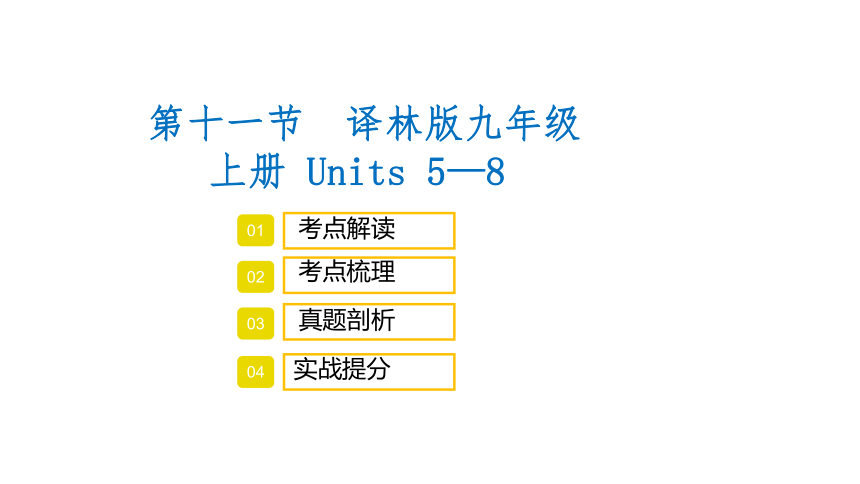 | |
| 格式 | pptx | ||
| 文件大小 | 567.8KB | ||
| 资源类型 | 教案 | ||
| 版本资源 | 牛津译林版 | ||
| 科目 | 英语 | ||
| 更新时间 | 2022-05-11 22:55:21 | ||
图片预览

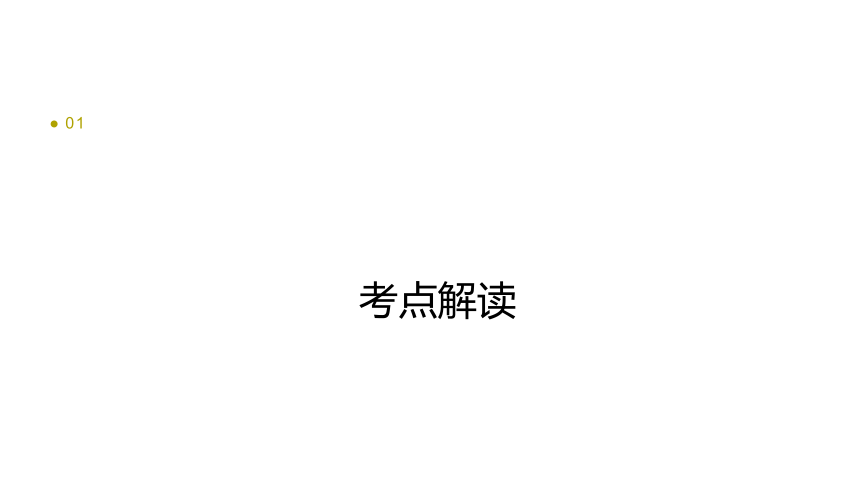
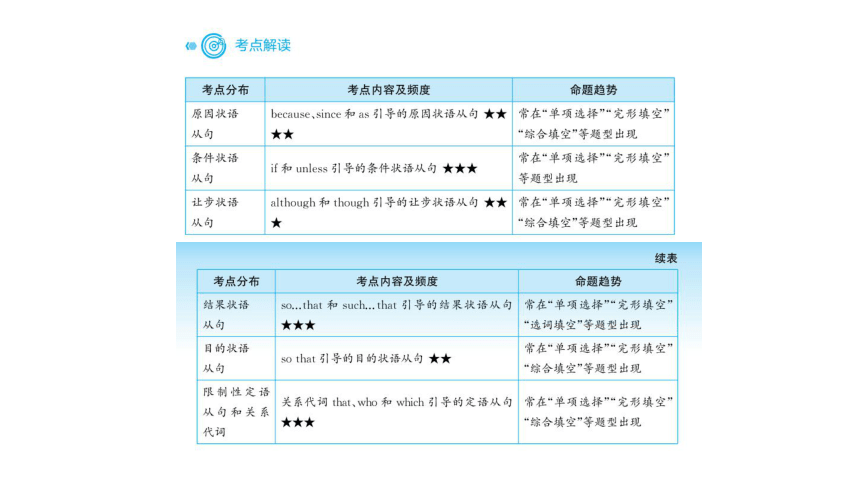

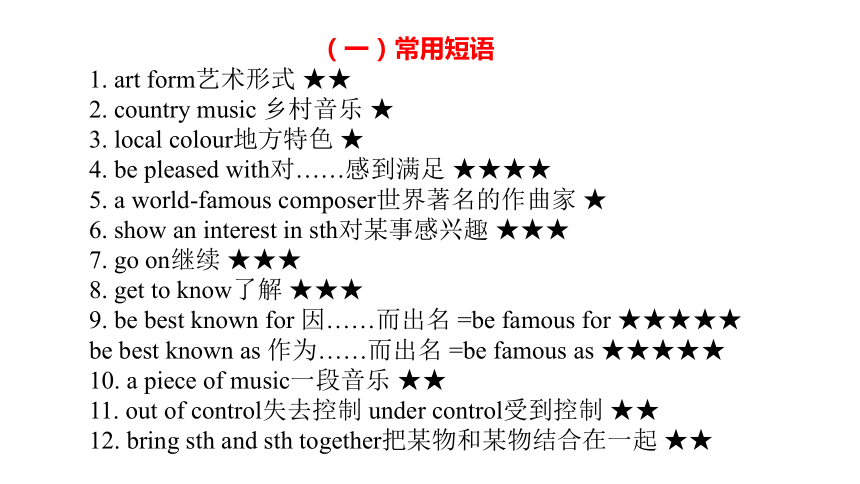
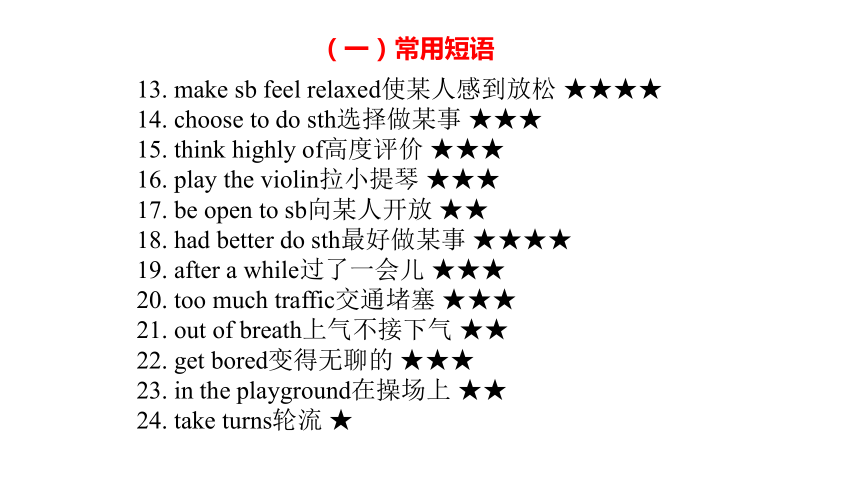
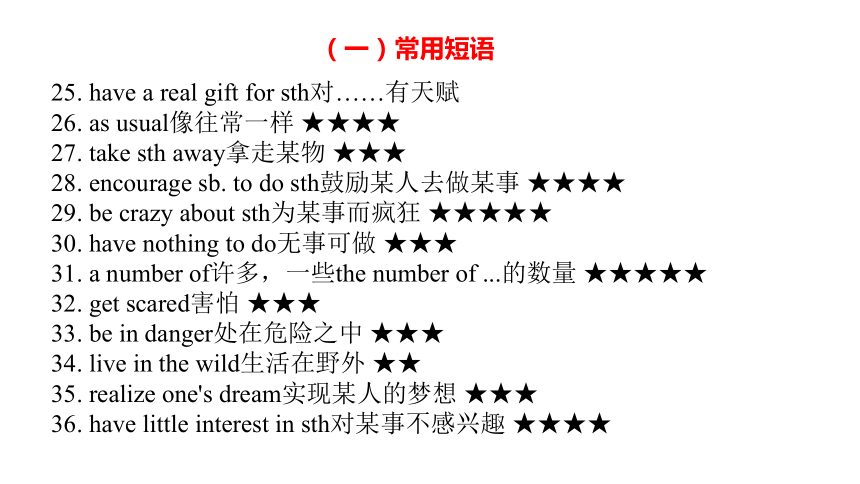
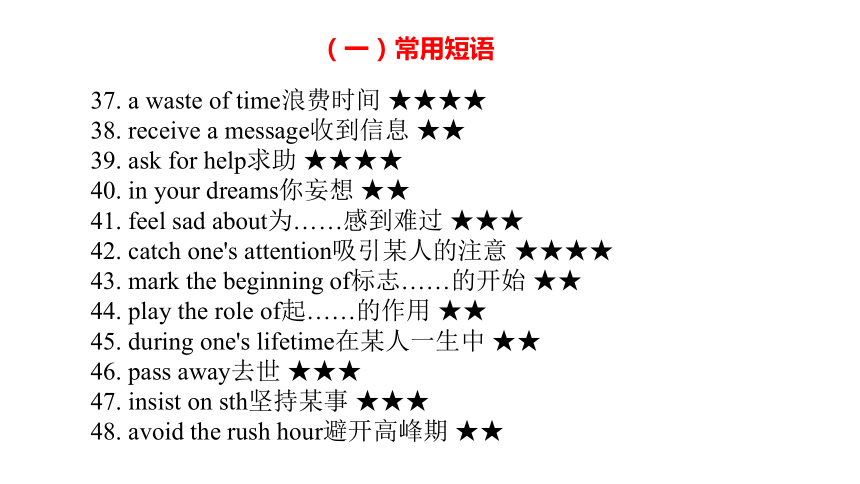
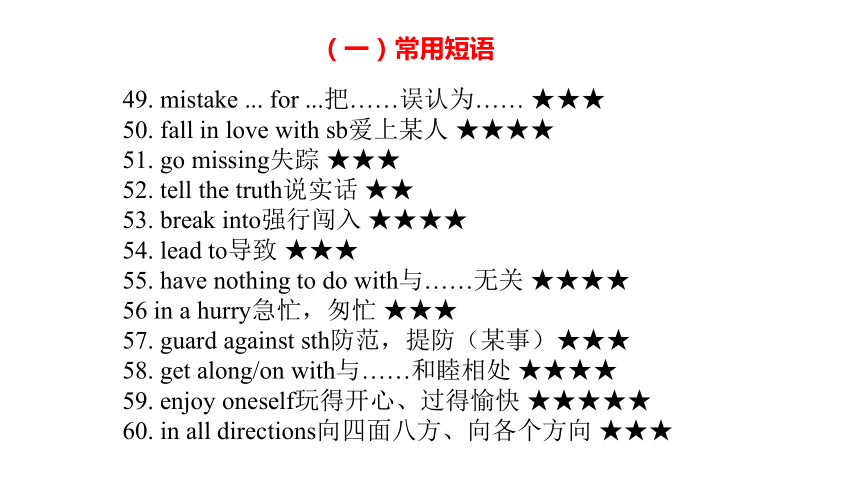
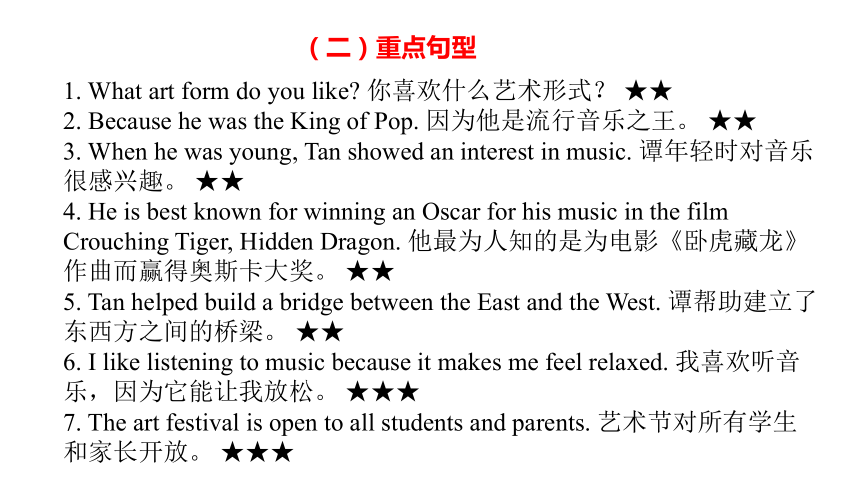
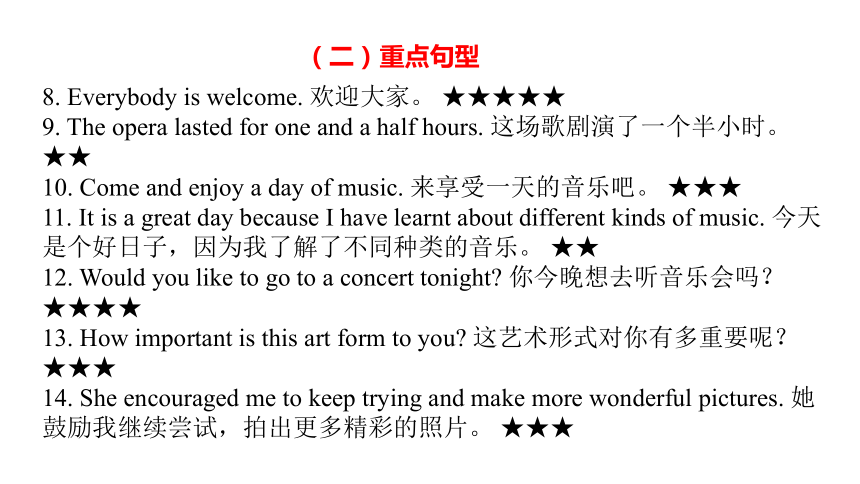
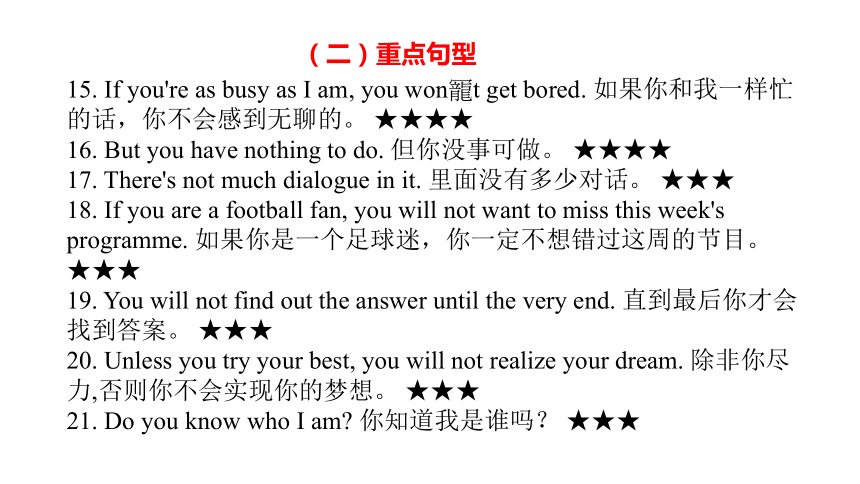
文档简介
(共78张PPT)
01
考点解读
02
03
04
考点梳理
真题剖析
实战提分
第十一节 译林版九年级上册 Units 5—8
01
考点解读
02
考点梳理
(一)常用短语
1. art form艺术形式 ★★
2. country music 乡村音乐 ★
3. local colour地方特色 ★
4. be pleased with对……感到满足 ★★★★
5. a world-famous composer世界著名的作曲家 ★
6. show an interest in sth对某事感兴趣 ★★★
7. go on继续 ★★★
8. get to know了解 ★★★
9. be best known for 因……而出名 =be famous for ★★★★★
be best known as 作为……而出名 =be famous as ★★★★★
10. a piece of music一段音乐 ★★
11. out of control失去控制 under control受到控制 ★★
12. bring sth and sth together把某物和某物结合在一起 ★★
(一)常用短语
13. make sb feel relaxed使某人感到放松 ★★★★
14. choose to do sth选择做某事 ★★★
15. think highly of高度评价 ★★★
16. play the violin拉小提琴 ★★★
17. be open to sb向某人开放 ★★
18. had better do sth最好做某事 ★★★★
19. after a while过了一会儿 ★★★
20. too much traffic交通堵塞 ★★★
21. out of breath上气不接下气 ★★
22. get bored变得无聊的 ★★★
23. in the playground在操场上 ★★
24. take turns轮流 ★
(一)常用短语
25. have a real gift for sth对……有天赋
26. as usual像往常一样 ★★★★
27. take sth away拿走某物 ★★★
28. encourage sb. to do sth鼓励某人去做某事 ★★★★
29. be crazy about sth为某事而疯狂 ★★★★★
30. have nothing to do无事可做 ★★★
31. a number of许多,一些the number of ...的数量 ★★★★★
32. get scared害怕 ★★★
33. be in danger处在危险之中 ★★★
34. live in the wild生活在野外 ★★
35. realize one's dream实现某人的梦想 ★★★
36. have little interest in sth对某事不感兴趣 ★★★★
(一)常用短语
37. a waste of time浪费时间 ★★★★
38. receive a message收到信息 ★★
39. ask for help求助 ★★★★
40. in your dreams你妄想 ★★
41. feel sad about为……感到难过 ★★★
42. catch one's attention吸引某人的注意 ★★★★
43. mark the beginning of标志……的开始 ★★
44. play the role of起……的作用 ★★
45. during one's lifetime在某人一生中 ★★
46. pass away去世 ★★★
47. insist on sth坚持某事 ★★★
48. avoid the rush hour避开高峰期 ★★
(一)常用短语
49. mistake ... for ...把……误认为…… ★★★
50. fall in love with sb爱上某人 ★★★★
51. go missing失踪 ★★★
52. tell the truth说实话 ★★
53. break into强行闯入 ★★★★
54. lead to导致 ★★★
55. have nothing to do with与……无关 ★★★★
56 in a hurry急忙,匆忙 ★★★
57. guard against sth防范,提防(某事)★★★
58. get along/on with与……和睦相处 ★★★★
59. enjoy oneself玩得开心、过得愉快 ★★★★★
60. in all directions向四面八方、向各个方向 ★★★
(二)重点句型
1. What art form do you like 你喜欢什么艺术形式? ★★
2. Because he was the King of Pop. 因为他是流行音乐之王。 ★★
3. When he was young, Tan showed an interest in music. 谭年轻时对音乐很感兴趣。 ★★
4. He is best known for winning an Oscar for his music in the film Crouching Tiger, Hidden Dragon. 他最为人知的是为电影《卧虎藏龙》作曲而赢得奥斯卡大奖。 ★★
5. Tan helped build a bridge between the East and the West. 谭帮助建立了东西方之间的桥梁。 ★★
6. I like listening to music because it makes me feel relaxed. 我喜欢听音乐,因为它能让我放松。 ★★★
7. The art festival is open to all students and parents. 艺术节对所有学生和家长开放。 ★★★
(二)重点句型
8. Everybody is welcome. 欢迎大家。 ★★★★★
9. The opera lasted for one and a half hours. 这场歌剧演了一个半小时。 ★★
e and enjoy a day of music. 来享受一天的音乐吧。 ★★★
11. It is a great day because I have learnt about different kinds of music. 今天是个好日子,因为我了解了不同种类的音乐。 ★★
12. Would you like to go to a concert tonight 你今晚想去听音乐会吗? ★★★★
13. How important is this art form to you 这艺术形式对你有多重要呢? ★★★
14. She encouraged me to keep trying and make more wonderful pictures. 她鼓励我继续尝试,拍出更多精彩的照片。 ★★★
(二)重点句型
15. If you're as busy as I am, you won?t get bored. 如果你和我一样忙的话,你不会感到无聊的。 ★★★★
16. But you have nothing to do. 但你没事可做。 ★★★★
17. There's not much dialogue in it. 里面没有多少对话。 ★★★
18. If you are a football fan, you will not want to miss this week's programme. 如果你是一个足球迷,你一定不想错过这周的节目。 ★★★
19. You will not find out the answer until the very end. 直到最后你才会找到答案。 ★★★
20. Unless you try your best, you will not realize your dream. 除非你尽力,否则你不会实现你的梦想。 ★★★
21. Do you know who I am 你知道我是谁吗? ★★★
(二)重点句型
22. I'm so good that I should be in Hollywood instead. 我太棒了,我应该去好莱坞。 ★★
23. Who do you think would be suitable for entering the film industry 你认为谁适合进入电影行业? ★★
24. Millie is such a good storyteller that she can write exciting scripts. Millie 是一个很会讲故事的人,她能写出令人兴奋的剧本。 ★★
25. Though I like acting, I'd rather be a director. 虽然我喜欢演戏,但我更想当导演。 ★★★
26. Some people mistook her for a real princess. 有些人误以为她是真正的公主。 ★★★
27. Neither do I. 我也不……。 ★★★
28. Jackie Chan is considered by many people as a superstar. 成龙被很多人认为是超级巨星。 ★★★
(二)重点句型
28. Jackie Chan is considered by many people as a superstar. 成龙被很多人认为是超级巨星。 ★★★
29. He looks untidy and nervous. 他看起来又脏又紧张。 ★★★★
30. The person who/that killed the young man was his boss. 杀死那个年轻人的人是他的老板。 ★★★
31. It turned out that he had nothing to do with this case. 结果发现他和这个案子毫无关系。 ★★
32. He was in a hurry to catch a bus. 他急着去赶公交车。 ★★★
33. We should remember to lock the door when we leave home. 我们出门的时候要记得锁门。 ★★★
34. We'd better shut all the windows too. 我们最好也把所有的窗户都关上。 ★★★
35. We need to guard against any possible danger around us. 我们需要提防身边任何可能的危险。 ★★
(三)考点知识精讲
1. something pleasant令人愉快的某事
(1)形容词或者副词修饰不定代词,放在不定代词之后。
如:Mr Morgan is going to retire some where beautiful.
摩根先生想要在美丽的地方度过退休后的时光。
(2)pleasant adj. 令人愉快的,舒适的; a pleasant trip一次令人愉快的旅行;pleased adj. 高兴的,愉快的; be pleased to do sth乐意做某事; be pleased with sth对某事/物感到满意。
如:The teacher was pleased with the students' performance. 老师对学生们的表现很满意。
(三)考点知识精讲
pleasure n. 令人高兴的事情、乐事,乐趣;
with pleasure愉快地,乐意地。
如:I did the work with pleasure. 我很愿意做这份工作。
词词性词义用法例句pleasant形容词令人愉快的;舒适的。用于形容事物。We spent a pleasant day in the park.我们在公园玩得很开心。
pleased形容词欣喜的;高兴的;满意的。用于形容人,be pleased with/to。Why is your sister so pleased 为什么你的妹妹这么高兴?pleasure名词愉快;快乐;乐事;乐趣。take pleasure in(it's) my pleasure.
with pleasure.have the pleasure of.
—Thank you for helping me so much.
谢谢你这么帮助我。
—My pleasure. 能帮助你是我的荣幸。
(三)考点知识精讲
2. present sb with sth/present sth to sb把某物交给/颁发给/授予某人
如:On his retirement, colleagues presented him with a set of golf clubs. 在他退休之际,同事们赠给他一套高尔夫球杆。
present作动词,意为“颁发;提交:赠予”。
如:Now that the sports meet is over, our principal will present the prize. 既然运动会已结束,我们校长会颁奖。
present作名词,意为“礼物”。
如:What present do you want for Christmas this year 今年圣诞节你想要什么礼物?
present作形容词,意为“现在的,目前的”。
如:I'm not going to buy a car at the present high prices. 以目前的高价,我不打算买小汽车了。
【拓展】 at the present time =at present 目前,现在 for the present 暂时
(三)考点知识精讲
3. show an interest in sth对某事感兴趣(相当于 be interested in sth)。
show/take no interest in sth对某事无兴趣。词词性词义用法例句interest名词兴趣show/have/take an interest in sth.
The little boy shows interest in English.这个小男生对学习英语感兴趣。
interesting形容词有趣的
an interesting story
I like reading interesting stories. 我喜欢阅读有趣的故事。
interested形容词,感兴趣的
be interested in sth Sally is interested in history. 莎莉对历史感兴趣。
(三)考点知识精讲
4. sound n. 泛指在自然界中人所能听到的任何声音,意为“声音;响声”,有可数和不可数两种用法。
如:Strange sounds came from the next room. 奇怪的声音来自隔壁房间。
(1)sound作为连系动词,意为“听起来;听上去(给人以某种印象)”,常接形容词作表语,还可接名词、代词、介词短语或从句。
如:That sounds a good idea. 那听起来是一个好主意。
(2)sound作及物动词,意为“使……发出声音;发(音)”,作不及物动词时,意为“发声、响”。
如:The bell sounded for lunch at twelve o'clock. 午餐铃声在十二点敲响。
(三)考点知识精讲
5. keep doing sth一直做某事。
如:I kept thinking about the match in the afternoon. 我一直想着下午的那场比赛。
keep的其他用法:
(1)keep+形容词,意为“保持……”。
如:If you want to keep healthy, you should exercise more. 如果你想保持健康,你就应该多锻炼。
(2)keep sb/sth+形容词,意为“让某人/某物保持……”。
如:You should keep your room clean and tidy. 你应该保持你的房间干净整洁。
(三)考点知识精讲
(3)keep sb/sth doing sth意为“让某人/某物一直做某事”。
如:He kept us waiting at the gate. 他让我们一直在大门口等着。
(4)keep sb/sth from doing意为“阻止某人/某物做某事”。
如:We should keep farmers from cutting down the trees. 我们应该阻止农民们砍树。
(5)keep on doing sth意为“继续做某事”。
如:Prices keep on increasing. 价格不停地上涨。
(三)考点知识精讲
6. 原因状语从句,是指在复合句中表示主句动作发生原因的句子。
(1)because引导的原因状语从句。
①because引导的状语从句,可放于前半句,也可放于后半句。
如:Because it was raining, we had to stay at home. 因为下雨,我们只好待在家里。
=We had to stay at home because it was raining.
②because表示“因为”,表示动作发生的直接原因,语气很强,常用来回答why引导的疑问句。
如:—Why doesn't he go with us?他为什么不跟我们一起去?
—Because he's too tired today. 因为他今天太累了。
(三)考点知识精讲
③汉语习惯说“因为……所以……”,但使用英语时不能将so与 because连用。
如:Because my bike was broken,I went to school by bus. ( )
Because my bike was broken,so I went to school by bus yesterday. ( )
④because与 because of的区别。because是连词,其后接句子,because of是复合介词,其后接名词、代词、动名词what从句等。
如:I didn't buy it because it was too expensive. 我没有买是因为它太贵了。
=I didn't buy it because of its high price.
√
×
(三)考点知识精讲
(2)since和as引导的原因状语从句
①since表达“既然;由于;因为”,表示已知的、显然的理由,较为正式,常放句首。
如:Since it is late, I shall go home right now. (由于)时间不早了,我得马上回家了。
②as和 since的用法大体相同,表示附带说明的“双方已知的原因”。
如:As it is raining, you'd better take a taxi. 既然在下雨,你最好乘出租车。
(三)考点知识精讲
7. get bored with doing sth做某事无聊。
get bored/lost/fat说明get可以用作联系动词。
bored一般修饰人; boring一般修饰物。
8. need a little sleep睡一小觉。
need在句中可作情态动词和实义动词。特别注意 need doing,需要某事被做,同义词 require。
sleep的形容词sleepy和asleep。
feel sleepy想睡的;困的。fall asleep睡着。
如:When my father came home last night, we were all asleep. 我爸爸昨晚回家时,我们都睡着了。
(三)考点知识精讲
9. such as/for example 例如;比如
(1)such as一般用来列举同类人或物中的几个例子,插在被列举的例子和前面的名词之间,as后没有逗号。
如:He has been to many countries, such as America, Japan and Germany. 他去过很多国家,比如美国、日本和德国。
(2)for example一般只举同类人或物中的一个为例,作插入语,可置于句首、句中或句末。
如:For example, air is invisible. 例如,空气是看不见的。
He,for example,is a good student. 例如,他就是个好学生。
【注意】 在选择题中,判断的依据是:前后句中是否用逗号隔开,一般 for example后加逗号。
(三)考点知识精讲
10. a number of... 一些,许多;修饰可数名词复数,谓语动词用复数。
the number of ...的数量;考查后面的谓语动词形式,一般用单数。
如:A large number of letters are from single parents. 大量的信是来自单身父母。
The number of students in my class is fifty. 我的班里有五十个学生。
11. be full of充满 =be filled with。
前者是主系表结构,full为形容词,满的;后者为被动语态,filled为充满的意思。
如:The room is full of people. 这个房子挤满了人。
=The room is filled with people.
fill sth with sth用……把……充满。
如:Fill the bottle with water, Peter. 彼得,请把瓶子装满水。
(三)考点知识精讲
12. as well/also/too/either
(1)too和 as well 多用于口语中,语气较轻,通常用于肯定句或疑问句,一般不用于否定句,且通常放在句末。
如:He has to go too (as well). 他也得去。
Are they coming too (as well) 他们也来吗
【注意】 在me too, you too这类简略答语中,通常不用 as well或also。
(2)also 比 too 和 as well 正式,一般也不用于否定句,它在句中的位置通常是紧靠动词,即放在行为动词之前,特殊动词之后。有时为了强调也放在句末(但不常见)。
如:He also came./He came also. 他也来了。
She is young and beautiful,and also rich. 她年轻漂亮,而且有钱。
说明:also 有时用于句首(其后通常有逗号),相当于连词 and。
如:Also, his mother was dead. 再说,他母亲又过世了。
(三)考点知识精讲
(3)either(也)通常只用于否定句,且要放在句末。
如:I don't know, either. 我也不知道。
He hasn't finished it, either. 他也还没有做完。
13. have a chance to do sth有机会做某事。
如:I'm glad I have a chance to make a speech here. 我很高兴有机会在这里发表演讲。
14. stop sb from doing sth.阻止某人做某事=prevent/keep sb from doing sth.
如:What stopped him from coming here 是什么阻止他来这里?
The heavy rain kept us from coming on time. 大雨阻止我们按时到来。
(三)考点知识精讲
15. if和unless条件状语从句
(1)if引导的条件状语从句
①用if条件句表达客观真理或普遍现象,主从句时态均用一般现在时,即主现从现。
如:If you freeze water, it turns into ice. 如果你把水冻结,它就会变成冰。
A fish dies if you take it out of water. 如果你把鱼从水里拿出来,它就会死。
②用if条件句表示将来可能发生的事情,主句用一般将来时,而if从句用一般现在时表示将来的时间,即主将从现。
如:If I like the house, I will buy it. 如果我喜欢这房子,我就会把它买下。
I will tell her if I see her. 如果我见到她,我就会告诉她。
(三)考点知识精讲
注:主句中的will也可以用情态动词can,may或 might等代替。
如:If they are friendly, I might invite them to the party.如果他们很友善,我可能会请他们去参加聚会。
If we hurry now, we can stop for coffee later. 如果我们现在抓紧时间,就可以稍后去喝咖啡。
【注意】 在条件句中,主句部分只能使用动词will的一般将来时,不能使用 be going to的结构。
(2)unless引导的条件状语从句(unless=if not)“除非,否则”。
如:The concert will be held as schedule unless there is a typhoon. =The concert will be held as schedule if there is not a typhoon. 除非刮台风,否则演唱会将如期进行。
She will keep on singing unless she is told to stop.=She will keep on singing if she is not told to stop. 她会一直唱下去,除非有人叫她停止。
(三)考点知识精讲
16. You are very lucky. 你很幸运。
a lucky dog一个幸运儿 an unlucky number一个不幸运的数字
Good luck to you. 祝你好运。
luck n. 幸运 lucky adj. 幸运的 luckily adv. 幸运地
unlucky adj. 不幸运的 unluckily adv. 不幸运地
如:Luckily, we passed the exam. 幸运的是,我们通过了考试。
17. in your dream你做梦,你妄想
stop day dreaming停止做白日梦。
dream of/about sth梦想某物。realize one's dream实现某人的梦想。
(三)考点知识精讲
18. so...that.../such...that...
(1)so+形容词/副词+that从句,如此……以至于……(某人可以做/不能做)。
如:He ran so fast that most of us couldn't follow him. 他跑得太快了,我们大多数人都跟不上他。
He was so stupid that he made such a silly mistake. 他太蠢了,以致犯了这么愚蠢的错误。
(2)such+名词短语+that从句。
如:It is such a beautiful day that I want to have a day off. 今天天气这么好,以致我想休息一天。
such an important job=so important a job如此重要的工作。
(三)考点知识精讲
19. would rather do sth. than do sth 宁可做……也不做……;prefer doing sth. to doing sth 喜欢做……胜过做……;prefer to do sth. (rather) than do sth 宁可做……也不做……。
如:I would rather go than stay here. 我宁愿走也不留在这儿。
She prefers singing and dancing to drawing. 比起画画来,他更喜欢唱歌跳舞。
I prefer to stay at home than go out for a walk. 我宁可待在家里也不原意出去散步。
(三)考点知识精讲
20. the loss of... ……的丧失/损失。
lose-lost-lost失去;丢失;输。
lose a chance失去一个机会。
lose one's way=get lost迷路。
lose the match输了比赛。
21. work as/work for
work as +表示职业的名词,作为……而工作;充当,担任。
work for+名词/代词,为……而工作;为……而效力。
如:He works as a teacher. 他作为一名老师而工作。(换句话说是“他是老师。”)
He doesn't want to work there for such little money. 他不想为这点钱在那里工作。
work on 从事于……;致力于……
work out 算出
如:He works on his model plane. 他把精力花在飞机模型上。
Can you work out the maths problem 你能算出这道数学题吗?
(三)考点知识精讲
22. choose n. 选择, choose from... 从……中选择;choose sb as/to be 选择某人作为/去做;choose sb to do sth选择某人去做某事; choice n. 选择.
如:Tom has no choice but to stay at home all day. 汤姆除了整天待在家别无选择。
23. become world-famous变得出名;
be famous/well-known for... 因……出名;
be famous/well-known as... 作为……出名;
It's well-known that... ……是众所周知的;
It's unknown that... ……是不为人知的。
如:He is famous for his great inventions. 因为他的伟大发明,他出名了。
He is famous as a great inventor. 他是著名的伟大的发明家。
(三)考点知识精讲
24. avoid sth/avoid doing sth避免做某事。
如:No one can avoid his own responsibility. 没有人能够逃避自己的责任。
He'll grab at any excuse to avoid doing the dishes. 他会随便找个借口来逃避洗碗。
25. remember to do sth记得去做某事;remember doing sth记得做过某事。
如:I will remember to tell her about it. 我会记得去告诉她这个事。
Don't you remember telling me the story yesterday 你不记得昨天告诉过我这个故事了吗?
类似的用法还有:forget doing sth忘记做过……事(已做),forget to do sth忘记该做……事(还未做)。
(三)考点知识精讲
26. happened to do sth某人碰巧做了某事。
happened to sb某事发生在了某人身 (常指不好的事情)。
What happened?发生了什么?
What is happening?正在发生什么?
如:We happened to discover we had a friend in common. 我们凑巧发现我们有一个共同的朋友。
A car accident happened to her this morning. 她今天早上出车祸了。
易混辨析take place/happentake place多指通过人为安排的发生。happen泛指一切事物或情况的发生,强调动作的偶然性。
【注意】 take place和happen都没有被动语态。
如:Where and when did the robbery take place 这抢劫发生在何时何地?
The accident happened at six o'clock. 事故发生在六点钟。
(三)考点知识精讲
27. consider...as/to be把……看作……
如:consider him to be/as a superstar
consider doing sth考虑做某事。
如:I am considering going or not. 我正在考虑去不去。
28. even/much/a little/a bit far+比较级;quite/very/so/as/too+原级。
如:His achievement is far more than that. 他的成就远不止这个。
The little girl is so lovely. 这个小女孩真可爱。
(三)考点知识精讲
29. although和though引导的让步状语从句。
(1)两词同义可换用,但although语气较重,通常放在句首并用于正式场合。
如:I'd quite like to go out,although/though it is a bit late. 我很想外出,虽然为时稍晚。
(2)只用 though不用 although的情况。
①用though时,可将强调的词前置,但 although不能。
如:Poor though he is, he is happy. 虽然他穷,但过得很愉快。
②although只用作连词,而 though除作连词外,还可用作副词,常置句末,句子较长时,也置于句中。
如:It's hard work, I enjoy it though. 这是苦差事,可我干得颇有乐趣。
③though常用于省略句。
如:Though(he is)alone, he is happy. 虽然他一个人,他很开心。
(三)考点知识精讲
30. so that引导的目的状语从句。
I always write carefully so that I may make my meaning clear. 我写作总是字斟句酌,是为了让人看懂我的意思。
so that意思是“以便”,可以与in order that相替换。
如:I will give you all the facts so that you can judge for yourself.=I will give you all the facts in order that you can judge for yourself.我把所有的事实都告诉你,使你自己能做出判断。
(三)考点知识精讲
31. dress v. 穿;穿着
be/get dressed in =wear=be in 穿……
dress up as装扮成……
dress sb/oneself 给某人穿衣服/给自己穿衣考点
易混辨析dress/put on/weardress 后接sb,“给……穿衣”,表示动作。put on 后接sth,“穿上(衣服)”,表示动作。wear 后接sth,“穿着……”, 相当于be/get dressed in或 be in,表示状态。如:She took off the old dress and put on a new one. 她脱下旧衣服换上了新的。
She hurriedly dressed her son and drove him to the nearest hospital.
她赶紧给儿子穿好衣服,开车送他去最近的医院。
I wear a coat and a pair of trousers today. 我今天穿了外套和裤子。
(三)考点知识精讲
32. go missing表示“不见了”,这里go充当连系动词,跟形容词。
missing是动词miss的现在分词形式,相当于形容词,表示“失去的、下落不明的、失踪的、错过的”。
易混辨析 missing/gone/lost
missing 缺少的;失去的强调某人或某物暂时找不见了(含有最终可能找到之意)。gone 不复存
在的含有一去不复返之意,可作表语或宾语补足语。lost 失去的;丢失的含有难以找回的意思,可作定语、表语或宾语补足语。如:—When did your dog go missing 你的狗什么时候失踪的?
—It has been missing for two and a half days. 它已经失踪两天半了。
(三)考点知识精讲
33. lie的用法
词性词义原形-过去式-过去分词现在分词lie v. 说谎lie-lied-lied lying lie v. 躺下lie-lay-lain lying lay v. 下蛋 lay-laid-laid-laying
如:He is just a liar!He is lying to you!他只是一个骗子,他在说谎!
34. tell the truth说实话,说出真相
truth作名词,意为“事实,真相”。
true为形容词,意为“真实的”。
truly为副词,意为“真实地;真诚地”。
come true意为“实现,成真”。
如:We shall find out the truth early. 我们应该早点发现真相。
His dream will come true sooner or later. 他的梦想迟早会实现。
He truly loved his children. 他真的很爱他的孩子。
(三)考点知识精讲
35. sb. be last seen leaving the office某人最后一次被看见离开办公室
sb. be last seen doing sth.某人最后一次被看见做某事。
sb. be often seen to do sth.某人经常被看见做某事。
如:They are often seen to play basketball on the playground. 经常有人看见他们在操场上打篮球。
Some girl students were seen singing in the classroom just now. 刚才有人看见一些女生在教室里唱歌。
(三)考点知识精讲
36. find out 找出,查明;弄清。通常指经过努力查明事情的真相。
如:At last, the teacher found out who gave her the card. 最后,这位老师弄清楚了是谁送给她的贺卡。
易混辨析 find out/find/look forfind out查明、找出、弄清指把事情查清楚、弄明白。find找到、发现强调“找”的结果。look for寻找强调“找”的动作。
如:I found that book under the bed in the end. 最后,我在床底下找到了那本书。
Tom is looking for his glasses. 汤姆正在寻找他的眼镜。
(三)考点知识精讲
37. somewhere在某处
somewhere 副词,意为“在某处”,常用在肯定句中,在否定句或疑问句中通常用 anywhere。
如:I've got a feeling I've seen him somewhere before. 我有种感觉,我以前在某个地方见过他。
【注意】 当形容词修饰复合不定代词或不定副词时,要把形容词放在不定代词或不定副词后面。
如:I'd like to go somewhere interesting for my vacation. 我想去某个有趣的地方度假。
(三)考点知识精讲
38. whether 连词,意为“是否”,有疑问的含义。一般情况下 whether和if可以互换,都可放在ask,want to know,wonder等词的后面引导宾语从句。但在以下几种情况中通常只能用whether。
(1)whether之后紧跟 or not时,不可与if互换。
如:I can't say whether or not they can come on time. 我说不准他们是否能按时来。
(2)在介词后只能用 whether。
如:I'm thinking about whether we should go to see the film. 我在考虑我们是否应该去看那部电影。
(3)与动词不定式连用时,只能用 whether。
如:I can't decide whether to go or to stay. 我不能决定是走是留。
(4)whether引导主语从句、表语从句,不可与if互换。
如:Whether the question is true is a mystery yet. 这个问题是否是真的还是一个谜。
The question is whether it is true. 这个问题是否是真的。
(三)考点知识精讲
39. as a result 固定短语,意为“因此;结果”,它可放在句首、句尾,也可放在句子中间。另一个相似的结构是 as a result of,意为“由于;作为……结果”,相当于 because of。
如:It is raining hard, as a result, we can't go out. 雨下得很大,因此我们不能出去了。
We can't take a walk as a result of the strong wind. 由于强风,我们不能去散步了。
=We can't take a walk because of the strong wind.
(三)考点知识精讲
40. be charged with 被指控……
sb be charged with sth/doing sth 某人被指控做某事。
其主动结构是:charge sb with表示“指控某人有……”。
如:The police charged him with stealing. 警方指控他偷钱。
He was charged with murder last month. 上个月他被指控谋杀。
charge v. 表示“收费”,常与介词for连用。
charge sb+money+ for sth想某人收取某物的费用。
如:The hotel charged me 30 dollars for a room for one night. 酒店收了我30美元一晚的房费。
(三)考点知识精讲
41. break into 闯入,侵入,强行进入
break down 出故障;break in 打断;break out 爆发;break off 断开;break up 粉碎;break the law 违反法律;break the record 打破纪录。
42. be supposed to do sth 应当做某事
suppose sb+adj 认为某人……。
suppose +that 从句猜想……。
如:I suppose we'll go there next week. 我想我们下周会去那里。
We all suppose him clever. 我们所有的人都认为他很聪明。
【注意】 在英语中,含suppose的句子是用否定主句谓语的方式来否定后面宾语从句的内容(即把宾语从句的否定词not转移到否定主句谓语动词上来),这种语言现象叫作否定前移,在这种用法中,suppose意为“想;认为;猜想”。
如:I don‘t suppose I'll trouble you again. 我想我不会再麻烦你了。
(三)考点知识精讲
43. have nothing to do with sth 表示“与……无关”
have something to do with sth表示“与……有关”。
如:I have nothing to do with the accident. 我和这意外事件无关。
The book has something to do with computers. 那本书与计算机有关。
44. do sth. in a hurry =hurry to do sth匆忙去做某事
如:Anna is in a hurry because the train is leaving in half an hour.安娜匆忙赶时间,因为火车还有半小时就要开了。
(三)考点知识精讲
45. had better (not) do sth 最好(不)做某事
如:It's cold outside. You'd better wear your coat. 外面很冷,你最好穿上你的大衣。
You'd better not stay up too late. 你最好不要太晚睡觉。
46. get along/on with sb.与某人和睦相处,其中 along可以用on来替换
如:How are you getting on with your classmates 你与你的同学们相处得怎么样?
get along/on well with sb 与某人相处很好
如:I found it important to get along well with friends. 我认为和朋友友好的相处是非常重要的。
(三)考点知识精讲
47. do sth for a living 做某事来谋生
如:No one knows what he does for a living. 没有人知道他是做什么来谋生的。
48. 定语从句和关系代词
(1)定语从句是指在一个句子中作定语的句子,定语从句要放在所修饰的词后。
如:The man who lives next to us is a policeman. 住在我隔壁的那个男人是一个警察。
You must do everything that I do. 你必须做我所做的事。
上面两句中的man和 everything是定语从句所修饰的词,叫先行词,定语从句放在先行词的后面。
(2)引导定语从句的关系代词有who, that, which, whom等常有三个作用:①引导定语从句;②代替先行词;③在定语从句中担当某个成分。
03
真题剖析
例1. (2019山东) I can’t understand the article ________
there are many new words in it.
A. so B. because C. though. D. if
【解析】本题考查连词的辨析。so因此;because因为;though尽管;if如果。句子 there are many new words in it表达的是我不能理解这篇文章的原因,此处用 because表示“因为”。故选B。
真题链接
例2. (2020江苏) -Do you know a new shopping mall opened in our town yesterday
-Yes. Why don’t we pay a visit ______ we have time.
A. until B. unless C. since D. though
【解析】本题考查连词的辨析。until引导时间状语从句;unless除非不,引导条件状语从句;since既然、自从,引导原因和时间状语从句;though虽然,引导让步状语从句。根据空格前后的句意可知,空格处的词引导原因状语从句,故选C。
例3. (2020重庆) Don’t miss the movie Green Book
_______ you want to know more about American culture.
A. unless B. until C. because D. if
【解析】本题考查连词的辨析。unless除非;until直到;because因为;if如果。由“Don’t miss the movie Green Book…you want to know...”可知,此处应为“如果你想更多地了解美国文化,不要错过电影《绿皮书》”,故用if引导条件状语从句。故选D。
真题链接
例4. (2020辽宁) —What do you think of the new movie
My People, My Country
—It’ _______ wonderful_______ I really like it.
A. so…that B. such…that
C. too…to D. enough…to
【解析】本题考查固定短语。so…that如此…以至于;such…that如此…以至于;too…to太…以至不能; enough…to足够…去做…。根据句子结构,so…that和such…that都可以引导结果状语从句,第二个空格后为句子,故C、D选项可排除。so是副词,后接形容词或副词;such是形容词,后接名词,第一个空格后是形容词wonderful,故选A。
真题链接
例5. (2019长沙) They practiced running every day _____ they could win the running race.
A. if B. so that C. such that D. because
【解析】考查连词辨析。if如果,引导条件状语从句;so that以便,引导目的状语从句;such that连用时,that引导的是such的同位语从句。because引导原因状语从句。根据语境可知,他们每天练习跑步的目的是为了赢得赛跑,故此处应用so that引导目的状语从句。故选B。
真题链接
例6. (2020广西藤县) —What are you looking for
—I’m looking for the ring _______ my husband bought me last year.
A. that B. who C. whom D. it
【解析】本题考查定语从句关系代词。that指代人和物,从句中作主语或宾语;who指代人,从句中作主语或宾语;whom指代人,从句中作宾语;it人称代词主格或宾格,不能用作关系代词。根据先行词ring戒指为物,且在从句中作宾语,可知,需要用that作关系代词。故选A。
真题链接
例1. (2019重庆巴南) If it _______ tomorrow, would you
like to have a picnic with me
A. don’t rain B. doesn’t rain
C. won’t rain D. didn’t rain
【解析】此题容易误选C。本题考查条件状语从句。don’t rain一般现在时,主语为第二人称或人称复数;doesn’t rain一般现在时,主语为第三人称单数;won’t rain一般将来时;didn’t rain一般过去时。本句为if引导的条件状语从句,适合“主将从现”原则,故从句为一般现在时,且主语it为第三人称单数,故此处应为doesn’t rain。故选B。
易错剖析
例2. (2019辽宁) The old man leads a simple life, ______
he has a lot of wealth.
A. although B. because C. so D. unless
【解析】此题容易误选C。although尽管;because因为;so因此;unless除非。老人过着简朴的生活和尽管他很富有是让步关系,意为:老人过着简“朴的生活,尽管他很富有。故选A。
易错剖析
例3. (2019四川宜宾)She is so pleased with ________ he
has done _______ he keeps praising him.
A. what; that B. that; what
C. that; that D. /; that
【解析】此题容易误选B。根据句子结构可知,第一个空是宾语从句,作 be pleased with的宾语,从句中done后缺少宾语,故用what引导,that引导宾语从句时,在从句中不作成分;第二个空考查的是so…that“如此…以至于…”这个句型,应用that。故选A。
易错剖析
例6. (2020牡丹江) The house in ________ Lu Xun used
to live is now a museum.
A. that B. where C. which D. who
【解析】此题容易误选A。本题考查定语从句。that在定语从句中的先行词为人或物;where在定语从句中的先行词为地点;which在定语从句中的先行词为物;who在定语从句中的先行词为人。根据句子结构可知,本句中的先行词 The house在后面的定语从句中作状语,本应用关系副词 where引导从句。但在本题由于从句中live为不及物动词,不能直接加宾语,所以在关系代词之前加介词in构成了介宾结构,而介词in后只能用关系代词which,不能使用that。故选C。
易错剖析
04
实战提分
1. 获胜者__________ 2. 音乐家__________
3. 传统的__________ 4. 对话__________
5. 女演员__________ 6. 停车__________
7. 缺少的__________ 8. 真相__________
9. 猜测__________ 10. 敌人__________
基础过关
(一)单词检测。根据中文意思,写出下列单词。
winner
musician
traditional
dialogue
actress
park
missing
truth
guess
enemy
1. 艺术形式________________
2. 地方特色________________
3. 访谈节目________________
4. 强行闯入________________
5. 与……无关 ________________
6. out of breath________________
7. make up ________________
8. a number of ________________
9. in your dreams ________________
10. catch one's attention________________
基础过关
(二)短语回顾。根据中文或英文表达,翻译下列短语。
art form
have nothing to do with
chat show
break into
local colour
上气不接下气
编造
一些
你妄想
吸引某人的注意
拓展提升
(一)单词拼写。根据括号内所给的中文提示,正确拼写单词。
1. Each group should__________(提交)a report to the teacher after the survey.
2. We _____________(成功地)drove back to the centre of the city through the busy street.
3. Which of the following is an _______ (亚洲的)country?
4. In China, only the policemen are allowed to carry ______(枪).
5. I felt more relaxed as soon as I had made the _______(最后的)decision.
6. We classmates should live together_____________ (和平地).
present
successfully
Asian
gun
final
peacefully
9.There are only ten people on the bus. So the bus is______(拥挤的).
10. Can you tell me where the old man lives_________(精确地)?
拓展提升
(一)单词拼写。根据括号内所给的中文提示,正确拼写单词。
crowded
exactly
拓展提升
(二)词形变换。根据句意,用括号中所给单词的正确形式填空。
1. The house was made of ________ (stone).
2. They said they were interested in Chinese __________ (tradition) culture.
3. The newspaper is of great use because it provides people with the ________ (late) news.
4. All of us are football ________(fan) and often play football together after work.
5. Although she is not a beauty, many people find her __________ (attract).
6. Some people_________ (mistake)him for a director the other day.
stones
traditional
latest
fans
attraction
mistook
拓展提升
(二)词形变换。根据句意,用括号中所给单词的正确形式填空。
7. He is _______ (lie). Don’t believe him.
8. I didn’t go anywhere last night, because it rained__________(heavy).
9. We should take action to prevent all these things from ________(happen).
10. Though the little boy is young, he can dress________(he) without anyone‘s help.
lying
heavily
happening
himself
1. Mrs. Wang always asks us to _______ conversations in the English classes.
A. turn B. end up C. make up D. look up
2. ________ we stay in Japan,we'll visit Mount Fuji.
A. During B. When C. Until D. Before 3. 3.Mozart, a European musician, _________ music even when he was very young.
A. had a gift for B. dealt with
C. worked out D. did some research on
4.(2020合肥) ________ my grandpa is over 80 years old, he still looks strong and healthy.
A. Although B. Because C. Unless D. Until
拓展提升
(三)单项选择。从下列每小题所给的A、B、C、D四个选项中,选出可以填入空白处的最佳选项。
5. —Have you finished your housework_____ ?
—Yes,I've_______ done that .
A. yet; already B. already; yet
C. ever; never D. still; just
6. It is _____ fine weather ______ we can go on a picnic today.
A. so...that B. such...that C. too...to D. as...as
7. America is a(n) _______ country and it is also a developed country.
A. eastern B. western C. southern D. northern
8. (2019年山西) —Why don't you want to take on this job
—Because it's _______ my ability.
A. beyond B. with C. off D. above
拓展提升
9. (2020年贵港) —Do you know the boy _____got the first prize in the talent show
—Of course. He's my new neighbor.
A. whose B. whom C. which D. who
10. —Sorry, Linda. I picked up your handbag_______ .
—It doesn't matter.
A. for mistake B. by mistake C. of mistake D. by the mistake
11. (2019年郴州)The skirt _____ is made of silk is very expensive. I can't afford it.
A. what B. / C. that D. it
12. Have you found______ about the murder on the internet
A. anything new B. everything new C. new anything
D. new something
拓展提升
13. (2020年巴中)If it doesn't rain tomorrow, we ____ a picnic.
A. have B. will have C. have had D. are having
14. (2020年辽宁)____ you study harder, you won't pass the exam.
A. Because B. If C. Unless D. Until
15. (2020年南京)The old couple insist on living in a small village among the mountains _____ they can get closer to nature.
A. until B. unless C. even though D. so that
拓展提升
(四)完形填空。阅读下面短文,从所给的四个选项中选出最佳答案,并填入题前括号内。
Many people like music. They think music can 1 us happiness. For me, I like pop music best because it has great lyrics and I can sing 2 with it. Every day on my way to school or back 3 home. I’d like to put on my earphone to enjoy the music as 4 as I can. It has become my habit. When I was a little child, my father liked to buy some tapes for me 5 the presents on Children Day or other festivals. 6 to the music in my old recorder was a big interest for me at that 7 .And as far as I could remember, I spent most of my spare time in listening to music 8 I stayed at home. My 9 songs are My Heart will Go on, Hero, You raise me up and so on. How about you What songs do you like best Would you mind 10 me
( )1. A. get B. bring C. take D. send
( )2.A.along B. alone C. away D. after
( )3. A. to B. in C. at D. /
( )4. A. many B. more C. much D. most
( )5. A. like B. as C. to D. with
( )6. A. Listened B. Listen C. Listening D. Listens
( )7. A. time B. times C. a time D. some time
( )8. A. before B. after C. till D. when
( )9. A. good B. well C. favorite D. best
( )10. A. tell B. telling C. to tell D. told
B
A
D
C
B
C
A
D
C
B
本 课 结 束
01
考点解读
02
03
04
考点梳理
真题剖析
实战提分
第十一节 译林版九年级上册 Units 5—8
01
考点解读
02
考点梳理
(一)常用短语
1. art form艺术形式 ★★
2. country music 乡村音乐 ★
3. local colour地方特色 ★
4. be pleased with对……感到满足 ★★★★
5. a world-famous composer世界著名的作曲家 ★
6. show an interest in sth对某事感兴趣 ★★★
7. go on继续 ★★★
8. get to know了解 ★★★
9. be best known for 因……而出名 =be famous for ★★★★★
be best known as 作为……而出名 =be famous as ★★★★★
10. a piece of music一段音乐 ★★
11. out of control失去控制 under control受到控制 ★★
12. bring sth and sth together把某物和某物结合在一起 ★★
(一)常用短语
13. make sb feel relaxed使某人感到放松 ★★★★
14. choose to do sth选择做某事 ★★★
15. think highly of高度评价 ★★★
16. play the violin拉小提琴 ★★★
17. be open to sb向某人开放 ★★
18. had better do sth最好做某事 ★★★★
19. after a while过了一会儿 ★★★
20. too much traffic交通堵塞 ★★★
21. out of breath上气不接下气 ★★
22. get bored变得无聊的 ★★★
23. in the playground在操场上 ★★
24. take turns轮流 ★
(一)常用短语
25. have a real gift for sth对……有天赋
26. as usual像往常一样 ★★★★
27. take sth away拿走某物 ★★★
28. encourage sb. to do sth鼓励某人去做某事 ★★★★
29. be crazy about sth为某事而疯狂 ★★★★★
30. have nothing to do无事可做 ★★★
31. a number of许多,一些the number of ...的数量 ★★★★★
32. get scared害怕 ★★★
33. be in danger处在危险之中 ★★★
34. live in the wild生活在野外 ★★
35. realize one's dream实现某人的梦想 ★★★
36. have little interest in sth对某事不感兴趣 ★★★★
(一)常用短语
37. a waste of time浪费时间 ★★★★
38. receive a message收到信息 ★★
39. ask for help求助 ★★★★
40. in your dreams你妄想 ★★
41. feel sad about为……感到难过 ★★★
42. catch one's attention吸引某人的注意 ★★★★
43. mark the beginning of标志……的开始 ★★
44. play the role of起……的作用 ★★
45. during one's lifetime在某人一生中 ★★
46. pass away去世 ★★★
47. insist on sth坚持某事 ★★★
48. avoid the rush hour避开高峰期 ★★
(一)常用短语
49. mistake ... for ...把……误认为…… ★★★
50. fall in love with sb爱上某人 ★★★★
51. go missing失踪 ★★★
52. tell the truth说实话 ★★
53. break into强行闯入 ★★★★
54. lead to导致 ★★★
55. have nothing to do with与……无关 ★★★★
56 in a hurry急忙,匆忙 ★★★
57. guard against sth防范,提防(某事)★★★
58. get along/on with与……和睦相处 ★★★★
59. enjoy oneself玩得开心、过得愉快 ★★★★★
60. in all directions向四面八方、向各个方向 ★★★
(二)重点句型
1. What art form do you like 你喜欢什么艺术形式? ★★
2. Because he was the King of Pop. 因为他是流行音乐之王。 ★★
3. When he was young, Tan showed an interest in music. 谭年轻时对音乐很感兴趣。 ★★
4. He is best known for winning an Oscar for his music in the film Crouching Tiger, Hidden Dragon. 他最为人知的是为电影《卧虎藏龙》作曲而赢得奥斯卡大奖。 ★★
5. Tan helped build a bridge between the East and the West. 谭帮助建立了东西方之间的桥梁。 ★★
6. I like listening to music because it makes me feel relaxed. 我喜欢听音乐,因为它能让我放松。 ★★★
7. The art festival is open to all students and parents. 艺术节对所有学生和家长开放。 ★★★
(二)重点句型
8. Everybody is welcome. 欢迎大家。 ★★★★★
9. The opera lasted for one and a half hours. 这场歌剧演了一个半小时。 ★★
e and enjoy a day of music. 来享受一天的音乐吧。 ★★★
11. It is a great day because I have learnt about different kinds of music. 今天是个好日子,因为我了解了不同种类的音乐。 ★★
12. Would you like to go to a concert tonight 你今晚想去听音乐会吗? ★★★★
13. How important is this art form to you 这艺术形式对你有多重要呢? ★★★
14. She encouraged me to keep trying and make more wonderful pictures. 她鼓励我继续尝试,拍出更多精彩的照片。 ★★★
(二)重点句型
15. If you're as busy as I am, you won?t get bored. 如果你和我一样忙的话,你不会感到无聊的。 ★★★★
16. But you have nothing to do. 但你没事可做。 ★★★★
17. There's not much dialogue in it. 里面没有多少对话。 ★★★
18. If you are a football fan, you will not want to miss this week's programme. 如果你是一个足球迷,你一定不想错过这周的节目。 ★★★
19. You will not find out the answer until the very end. 直到最后你才会找到答案。 ★★★
20. Unless you try your best, you will not realize your dream. 除非你尽力,否则你不会实现你的梦想。 ★★★
21. Do you know who I am 你知道我是谁吗? ★★★
(二)重点句型
22. I'm so good that I should be in Hollywood instead. 我太棒了,我应该去好莱坞。 ★★
23. Who do you think would be suitable for entering the film industry 你认为谁适合进入电影行业? ★★
24. Millie is such a good storyteller that she can write exciting scripts. Millie 是一个很会讲故事的人,她能写出令人兴奋的剧本。 ★★
25. Though I like acting, I'd rather be a director. 虽然我喜欢演戏,但我更想当导演。 ★★★
26. Some people mistook her for a real princess. 有些人误以为她是真正的公主。 ★★★
27. Neither do I. 我也不……。 ★★★
28. Jackie Chan is considered by many people as a superstar. 成龙被很多人认为是超级巨星。 ★★★
(二)重点句型
28. Jackie Chan is considered by many people as a superstar. 成龙被很多人认为是超级巨星。 ★★★
29. He looks untidy and nervous. 他看起来又脏又紧张。 ★★★★
30. The person who/that killed the young man was his boss. 杀死那个年轻人的人是他的老板。 ★★★
31. It turned out that he had nothing to do with this case. 结果发现他和这个案子毫无关系。 ★★
32. He was in a hurry to catch a bus. 他急着去赶公交车。 ★★★
33. We should remember to lock the door when we leave home. 我们出门的时候要记得锁门。 ★★★
34. We'd better shut all the windows too. 我们最好也把所有的窗户都关上。 ★★★
35. We need to guard against any possible danger around us. 我们需要提防身边任何可能的危险。 ★★
(三)考点知识精讲
1. something pleasant令人愉快的某事
(1)形容词或者副词修饰不定代词,放在不定代词之后。
如:Mr Morgan is going to retire some where beautiful.
摩根先生想要在美丽的地方度过退休后的时光。
(2)pleasant adj. 令人愉快的,舒适的; a pleasant trip一次令人愉快的旅行;pleased adj. 高兴的,愉快的; be pleased to do sth乐意做某事; be pleased with sth对某事/物感到满意。
如:The teacher was pleased with the students' performance. 老师对学生们的表现很满意。
(三)考点知识精讲
pleasure n. 令人高兴的事情、乐事,乐趣;
with pleasure愉快地,乐意地。
如:I did the work with pleasure. 我很愿意做这份工作。
词词性词义用法例句pleasant形容词令人愉快的;舒适的。用于形容事物。We spent a pleasant day in the park.我们在公园玩得很开心。
pleased形容词欣喜的;高兴的;满意的。用于形容人,be pleased with/to。Why is your sister so pleased 为什么你的妹妹这么高兴?pleasure名词愉快;快乐;乐事;乐趣。take pleasure in(it's) my pleasure.
with pleasure.have the pleasure of.
—Thank you for helping me so much.
谢谢你这么帮助我。
—My pleasure. 能帮助你是我的荣幸。
(三)考点知识精讲
2. present sb with sth/present sth to sb把某物交给/颁发给/授予某人
如:On his retirement, colleagues presented him with a set of golf clubs. 在他退休之际,同事们赠给他一套高尔夫球杆。
present作动词,意为“颁发;提交:赠予”。
如:Now that the sports meet is over, our principal will present the prize. 既然运动会已结束,我们校长会颁奖。
present作名词,意为“礼物”。
如:What present do you want for Christmas this year 今年圣诞节你想要什么礼物?
present作形容词,意为“现在的,目前的”。
如:I'm not going to buy a car at the present high prices. 以目前的高价,我不打算买小汽车了。
【拓展】 at the present time =at present 目前,现在 for the present 暂时
(三)考点知识精讲
3. show an interest in sth对某事感兴趣(相当于 be interested in sth)。
show/take no interest in sth对某事无兴趣。词词性词义用法例句interest名词兴趣show/have/take an interest in sth.
The little boy shows interest in English.这个小男生对学习英语感兴趣。
interesting形容词有趣的
an interesting story
I like reading interesting stories. 我喜欢阅读有趣的故事。
interested形容词,感兴趣的
be interested in sth Sally is interested in history. 莎莉对历史感兴趣。
(三)考点知识精讲
4. sound n. 泛指在自然界中人所能听到的任何声音,意为“声音;响声”,有可数和不可数两种用法。
如:Strange sounds came from the next room. 奇怪的声音来自隔壁房间。
(1)sound作为连系动词,意为“听起来;听上去(给人以某种印象)”,常接形容词作表语,还可接名词、代词、介词短语或从句。
如:That sounds a good idea. 那听起来是一个好主意。
(2)sound作及物动词,意为“使……发出声音;发(音)”,作不及物动词时,意为“发声、响”。
如:The bell sounded for lunch at twelve o'clock. 午餐铃声在十二点敲响。
(三)考点知识精讲
5. keep doing sth一直做某事。
如:I kept thinking about the match in the afternoon. 我一直想着下午的那场比赛。
keep的其他用法:
(1)keep+形容词,意为“保持……”。
如:If you want to keep healthy, you should exercise more. 如果你想保持健康,你就应该多锻炼。
(2)keep sb/sth+形容词,意为“让某人/某物保持……”。
如:You should keep your room clean and tidy. 你应该保持你的房间干净整洁。
(三)考点知识精讲
(3)keep sb/sth doing sth意为“让某人/某物一直做某事”。
如:He kept us waiting at the gate. 他让我们一直在大门口等着。
(4)keep sb/sth from doing意为“阻止某人/某物做某事”。
如:We should keep farmers from cutting down the trees. 我们应该阻止农民们砍树。
(5)keep on doing sth意为“继续做某事”。
如:Prices keep on increasing. 价格不停地上涨。
(三)考点知识精讲
6. 原因状语从句,是指在复合句中表示主句动作发生原因的句子。
(1)because引导的原因状语从句。
①because引导的状语从句,可放于前半句,也可放于后半句。
如:Because it was raining, we had to stay at home. 因为下雨,我们只好待在家里。
=We had to stay at home because it was raining.
②because表示“因为”,表示动作发生的直接原因,语气很强,常用来回答why引导的疑问句。
如:—Why doesn't he go with us?他为什么不跟我们一起去?
—Because he's too tired today. 因为他今天太累了。
(三)考点知识精讲
③汉语习惯说“因为……所以……”,但使用英语时不能将so与 because连用。
如:Because my bike was broken,I went to school by bus. ( )
Because my bike was broken,so I went to school by bus yesterday. ( )
④because与 because of的区别。because是连词,其后接句子,because of是复合介词,其后接名词、代词、动名词what从句等。
如:I didn't buy it because it was too expensive. 我没有买是因为它太贵了。
=I didn't buy it because of its high price.
√
×
(三)考点知识精讲
(2)since和as引导的原因状语从句
①since表达“既然;由于;因为”,表示已知的、显然的理由,较为正式,常放句首。
如:Since it is late, I shall go home right now. (由于)时间不早了,我得马上回家了。
②as和 since的用法大体相同,表示附带说明的“双方已知的原因”。
如:As it is raining, you'd better take a taxi. 既然在下雨,你最好乘出租车。
(三)考点知识精讲
7. get bored with doing sth做某事无聊。
get bored/lost/fat说明get可以用作联系动词。
bored一般修饰人; boring一般修饰物。
8. need a little sleep睡一小觉。
need在句中可作情态动词和实义动词。特别注意 need doing,需要某事被做,同义词 require。
sleep的形容词sleepy和asleep。
feel sleepy想睡的;困的。fall asleep睡着。
如:When my father came home last night, we were all asleep. 我爸爸昨晚回家时,我们都睡着了。
(三)考点知识精讲
9. such as/for example 例如;比如
(1)such as一般用来列举同类人或物中的几个例子,插在被列举的例子和前面的名词之间,as后没有逗号。
如:He has been to many countries, such as America, Japan and Germany. 他去过很多国家,比如美国、日本和德国。
(2)for example一般只举同类人或物中的一个为例,作插入语,可置于句首、句中或句末。
如:For example, air is invisible. 例如,空气是看不见的。
He,for example,is a good student. 例如,他就是个好学生。
【注意】 在选择题中,判断的依据是:前后句中是否用逗号隔开,一般 for example后加逗号。
(三)考点知识精讲
10. a number of... 一些,许多;修饰可数名词复数,谓语动词用复数。
the number of ...的数量;考查后面的谓语动词形式,一般用单数。
如:A large number of letters are from single parents. 大量的信是来自单身父母。
The number of students in my class is fifty. 我的班里有五十个学生。
11. be full of充满 =be filled with。
前者是主系表结构,full为形容词,满的;后者为被动语态,filled为充满的意思。
如:The room is full of people. 这个房子挤满了人。
=The room is filled with people.
fill sth with sth用……把……充满。
如:Fill the bottle with water, Peter. 彼得,请把瓶子装满水。
(三)考点知识精讲
12. as well/also/too/either
(1)too和 as well 多用于口语中,语气较轻,通常用于肯定句或疑问句,一般不用于否定句,且通常放在句末。
如:He has to go too (as well). 他也得去。
Are they coming too (as well) 他们也来吗
【注意】 在me too, you too这类简略答语中,通常不用 as well或also。
(2)also 比 too 和 as well 正式,一般也不用于否定句,它在句中的位置通常是紧靠动词,即放在行为动词之前,特殊动词之后。有时为了强调也放在句末(但不常见)。
如:He also came./He came also. 他也来了。
She is young and beautiful,and also rich. 她年轻漂亮,而且有钱。
说明:also 有时用于句首(其后通常有逗号),相当于连词 and。
如:Also, his mother was dead. 再说,他母亲又过世了。
(三)考点知识精讲
(3)either(也)通常只用于否定句,且要放在句末。
如:I don't know, either. 我也不知道。
He hasn't finished it, either. 他也还没有做完。
13. have a chance to do sth有机会做某事。
如:I'm glad I have a chance to make a speech here. 我很高兴有机会在这里发表演讲。
14. stop sb from doing sth.阻止某人做某事=prevent/keep sb from doing sth.
如:What stopped him from coming here 是什么阻止他来这里?
The heavy rain kept us from coming on time. 大雨阻止我们按时到来。
(三)考点知识精讲
15. if和unless条件状语从句
(1)if引导的条件状语从句
①用if条件句表达客观真理或普遍现象,主从句时态均用一般现在时,即主现从现。
如:If you freeze water, it turns into ice. 如果你把水冻结,它就会变成冰。
A fish dies if you take it out of water. 如果你把鱼从水里拿出来,它就会死。
②用if条件句表示将来可能发生的事情,主句用一般将来时,而if从句用一般现在时表示将来的时间,即主将从现。
如:If I like the house, I will buy it. 如果我喜欢这房子,我就会把它买下。
I will tell her if I see her. 如果我见到她,我就会告诉她。
(三)考点知识精讲
注:主句中的will也可以用情态动词can,may或 might等代替。
如:If they are friendly, I might invite them to the party.如果他们很友善,我可能会请他们去参加聚会。
If we hurry now, we can stop for coffee later. 如果我们现在抓紧时间,就可以稍后去喝咖啡。
【注意】 在条件句中,主句部分只能使用动词will的一般将来时,不能使用 be going to的结构。
(2)unless引导的条件状语从句(unless=if not)“除非,否则”。
如:The concert will be held as schedule unless there is a typhoon. =The concert will be held as schedule if there is not a typhoon. 除非刮台风,否则演唱会将如期进行。
She will keep on singing unless she is told to stop.=She will keep on singing if she is not told to stop. 她会一直唱下去,除非有人叫她停止。
(三)考点知识精讲
16. You are very lucky. 你很幸运。
a lucky dog一个幸运儿 an unlucky number一个不幸运的数字
Good luck to you. 祝你好运。
luck n. 幸运 lucky adj. 幸运的 luckily adv. 幸运地
unlucky adj. 不幸运的 unluckily adv. 不幸运地
如:Luckily, we passed the exam. 幸运的是,我们通过了考试。
17. in your dream你做梦,你妄想
stop day dreaming停止做白日梦。
dream of/about sth梦想某物。realize one's dream实现某人的梦想。
(三)考点知识精讲
18. so...that.../such...that...
(1)so+形容词/副词+that从句,如此……以至于……(某人可以做/不能做)。
如:He ran so fast that most of us couldn't follow him. 他跑得太快了,我们大多数人都跟不上他。
He was so stupid that he made such a silly mistake. 他太蠢了,以致犯了这么愚蠢的错误。
(2)such+名词短语+that从句。
如:It is such a beautiful day that I want to have a day off. 今天天气这么好,以致我想休息一天。
such an important job=so important a job如此重要的工作。
(三)考点知识精讲
19. would rather do sth. than do sth 宁可做……也不做……;prefer doing sth. to doing sth 喜欢做……胜过做……;prefer to do sth. (rather) than do sth 宁可做……也不做……。
如:I would rather go than stay here. 我宁愿走也不留在这儿。
She prefers singing and dancing to drawing. 比起画画来,他更喜欢唱歌跳舞。
I prefer to stay at home than go out for a walk. 我宁可待在家里也不原意出去散步。
(三)考点知识精讲
20. the loss of... ……的丧失/损失。
lose-lost-lost失去;丢失;输。
lose a chance失去一个机会。
lose one's way=get lost迷路。
lose the match输了比赛。
21. work as/work for
work as +表示职业的名词,作为……而工作;充当,担任。
work for+名词/代词,为……而工作;为……而效力。
如:He works as a teacher. 他作为一名老师而工作。(换句话说是“他是老师。”)
He doesn't want to work there for such little money. 他不想为这点钱在那里工作。
work on 从事于……;致力于……
work out 算出
如:He works on his model plane. 他把精力花在飞机模型上。
Can you work out the maths problem 你能算出这道数学题吗?
(三)考点知识精讲
22. choose n. 选择, choose from... 从……中选择;choose sb as/to be 选择某人作为/去做;choose sb to do sth选择某人去做某事; choice n. 选择.
如:Tom has no choice but to stay at home all day. 汤姆除了整天待在家别无选择。
23. become world-famous变得出名;
be famous/well-known for... 因……出名;
be famous/well-known as... 作为……出名;
It's well-known that... ……是众所周知的;
It's unknown that... ……是不为人知的。
如:He is famous for his great inventions. 因为他的伟大发明,他出名了。
He is famous as a great inventor. 他是著名的伟大的发明家。
(三)考点知识精讲
24. avoid sth/avoid doing sth避免做某事。
如:No one can avoid his own responsibility. 没有人能够逃避自己的责任。
He'll grab at any excuse to avoid doing the dishes. 他会随便找个借口来逃避洗碗。
25. remember to do sth记得去做某事;remember doing sth记得做过某事。
如:I will remember to tell her about it. 我会记得去告诉她这个事。
Don't you remember telling me the story yesterday 你不记得昨天告诉过我这个故事了吗?
类似的用法还有:forget doing sth忘记做过……事(已做),forget to do sth忘记该做……事(还未做)。
(三)考点知识精讲
26. happened to do sth某人碰巧做了某事。
happened to sb某事发生在了某人身 (常指不好的事情)。
What happened?发生了什么?
What is happening?正在发生什么?
如:We happened to discover we had a friend in common. 我们凑巧发现我们有一个共同的朋友。
A car accident happened to her this morning. 她今天早上出车祸了。
易混辨析take place/happentake place多指通过人为安排的发生。happen泛指一切事物或情况的发生,强调动作的偶然性。
【注意】 take place和happen都没有被动语态。
如:Where and when did the robbery take place 这抢劫发生在何时何地?
The accident happened at six o'clock. 事故发生在六点钟。
(三)考点知识精讲
27. consider...as/to be把……看作……
如:consider him to be/as a superstar
consider doing sth考虑做某事。
如:I am considering going or not. 我正在考虑去不去。
28. even/much/a little/a bit far+比较级;quite/very/so/as/too+原级。
如:His achievement is far more than that. 他的成就远不止这个。
The little girl is so lovely. 这个小女孩真可爱。
(三)考点知识精讲
29. although和though引导的让步状语从句。
(1)两词同义可换用,但although语气较重,通常放在句首并用于正式场合。
如:I'd quite like to go out,although/though it is a bit late. 我很想外出,虽然为时稍晚。
(2)只用 though不用 although的情况。
①用though时,可将强调的词前置,但 although不能。
如:Poor though he is, he is happy. 虽然他穷,但过得很愉快。
②although只用作连词,而 though除作连词外,还可用作副词,常置句末,句子较长时,也置于句中。
如:It's hard work, I enjoy it though. 这是苦差事,可我干得颇有乐趣。
③though常用于省略句。
如:Though(he is)alone, he is happy. 虽然他一个人,他很开心。
(三)考点知识精讲
30. so that引导的目的状语从句。
I always write carefully so that I may make my meaning clear. 我写作总是字斟句酌,是为了让人看懂我的意思。
so that意思是“以便”,可以与in order that相替换。
如:I will give you all the facts so that you can judge for yourself.=I will give you all the facts in order that you can judge for yourself.我把所有的事实都告诉你,使你自己能做出判断。
(三)考点知识精讲
31. dress v. 穿;穿着
be/get dressed in =wear=be in 穿……
dress up as装扮成……
dress sb/oneself 给某人穿衣服/给自己穿衣考点
易混辨析dress/put on/weardress 后接sb,“给……穿衣”,表示动作。put on 后接sth,“穿上(衣服)”,表示动作。wear 后接sth,“穿着……”, 相当于be/get dressed in或 be in,表示状态。如:She took off the old dress and put on a new one. 她脱下旧衣服换上了新的。
She hurriedly dressed her son and drove him to the nearest hospital.
她赶紧给儿子穿好衣服,开车送他去最近的医院。
I wear a coat and a pair of trousers today. 我今天穿了外套和裤子。
(三)考点知识精讲
32. go missing表示“不见了”,这里go充当连系动词,跟形容词。
missing是动词miss的现在分词形式,相当于形容词,表示“失去的、下落不明的、失踪的、错过的”。
易混辨析 missing/gone/lost
missing 缺少的;失去的强调某人或某物暂时找不见了(含有最终可能找到之意)。gone 不复存
在的含有一去不复返之意,可作表语或宾语补足语。lost 失去的;丢失的含有难以找回的意思,可作定语、表语或宾语补足语。如:—When did your dog go missing 你的狗什么时候失踪的?
—It has been missing for two and a half days. 它已经失踪两天半了。
(三)考点知识精讲
33. lie的用法
词性词义原形-过去式-过去分词现在分词lie v. 说谎lie-lied-lied lying lie v. 躺下lie-lay-lain lying lay v. 下蛋 lay-laid-laid-laying
如:He is just a liar!He is lying to you!他只是一个骗子,他在说谎!
34. tell the truth说实话,说出真相
truth作名词,意为“事实,真相”。
true为形容词,意为“真实的”。
truly为副词,意为“真实地;真诚地”。
come true意为“实现,成真”。
如:We shall find out the truth early. 我们应该早点发现真相。
His dream will come true sooner or later. 他的梦想迟早会实现。
He truly loved his children. 他真的很爱他的孩子。
(三)考点知识精讲
35. sb. be last seen leaving the office某人最后一次被看见离开办公室
sb. be last seen doing sth.某人最后一次被看见做某事。
sb. be often seen to do sth.某人经常被看见做某事。
如:They are often seen to play basketball on the playground. 经常有人看见他们在操场上打篮球。
Some girl students were seen singing in the classroom just now. 刚才有人看见一些女生在教室里唱歌。
(三)考点知识精讲
36. find out 找出,查明;弄清。通常指经过努力查明事情的真相。
如:At last, the teacher found out who gave her the card. 最后,这位老师弄清楚了是谁送给她的贺卡。
易混辨析 find out/find/look forfind out查明、找出、弄清指把事情查清楚、弄明白。find找到、发现强调“找”的结果。look for寻找强调“找”的动作。
如:I found that book under the bed in the end. 最后,我在床底下找到了那本书。
Tom is looking for his glasses. 汤姆正在寻找他的眼镜。
(三)考点知识精讲
37. somewhere在某处
somewhere 副词,意为“在某处”,常用在肯定句中,在否定句或疑问句中通常用 anywhere。
如:I've got a feeling I've seen him somewhere before. 我有种感觉,我以前在某个地方见过他。
【注意】 当形容词修饰复合不定代词或不定副词时,要把形容词放在不定代词或不定副词后面。
如:I'd like to go somewhere interesting for my vacation. 我想去某个有趣的地方度假。
(三)考点知识精讲
38. whether 连词,意为“是否”,有疑问的含义。一般情况下 whether和if可以互换,都可放在ask,want to know,wonder等词的后面引导宾语从句。但在以下几种情况中通常只能用whether。
(1)whether之后紧跟 or not时,不可与if互换。
如:I can't say whether or not they can come on time. 我说不准他们是否能按时来。
(2)在介词后只能用 whether。
如:I'm thinking about whether we should go to see the film. 我在考虑我们是否应该去看那部电影。
(3)与动词不定式连用时,只能用 whether。
如:I can't decide whether to go or to stay. 我不能决定是走是留。
(4)whether引导主语从句、表语从句,不可与if互换。
如:Whether the question is true is a mystery yet. 这个问题是否是真的还是一个谜。
The question is whether it is true. 这个问题是否是真的。
(三)考点知识精讲
39. as a result 固定短语,意为“因此;结果”,它可放在句首、句尾,也可放在句子中间。另一个相似的结构是 as a result of,意为“由于;作为……结果”,相当于 because of。
如:It is raining hard, as a result, we can't go out. 雨下得很大,因此我们不能出去了。
We can't take a walk as a result of the strong wind. 由于强风,我们不能去散步了。
=We can't take a walk because of the strong wind.
(三)考点知识精讲
40. be charged with 被指控……
sb be charged with sth/doing sth 某人被指控做某事。
其主动结构是:charge sb with表示“指控某人有……”。
如:The police charged him with stealing. 警方指控他偷钱。
He was charged with murder last month. 上个月他被指控谋杀。
charge v. 表示“收费”,常与介词for连用。
charge sb+money+ for sth想某人收取某物的费用。
如:The hotel charged me 30 dollars for a room for one night. 酒店收了我30美元一晚的房费。
(三)考点知识精讲
41. break into 闯入,侵入,强行进入
break down 出故障;break in 打断;break out 爆发;break off 断开;break up 粉碎;break the law 违反法律;break the record 打破纪录。
42. be supposed to do sth 应当做某事
suppose sb+adj 认为某人……。
suppose +that 从句猜想……。
如:I suppose we'll go there next week. 我想我们下周会去那里。
We all suppose him clever. 我们所有的人都认为他很聪明。
【注意】 在英语中,含suppose的句子是用否定主句谓语的方式来否定后面宾语从句的内容(即把宾语从句的否定词not转移到否定主句谓语动词上来),这种语言现象叫作否定前移,在这种用法中,suppose意为“想;认为;猜想”。
如:I don‘t suppose I'll trouble you again. 我想我不会再麻烦你了。
(三)考点知识精讲
43. have nothing to do with sth 表示“与……无关”
have something to do with sth表示“与……有关”。
如:I have nothing to do with the accident. 我和这意外事件无关。
The book has something to do with computers. 那本书与计算机有关。
44. do sth. in a hurry =hurry to do sth匆忙去做某事
如:Anna is in a hurry because the train is leaving in half an hour.安娜匆忙赶时间,因为火车还有半小时就要开了。
(三)考点知识精讲
45. had better (not) do sth 最好(不)做某事
如:It's cold outside. You'd better wear your coat. 外面很冷,你最好穿上你的大衣。
You'd better not stay up too late. 你最好不要太晚睡觉。
46. get along/on with sb.与某人和睦相处,其中 along可以用on来替换
如:How are you getting on with your classmates 你与你的同学们相处得怎么样?
get along/on well with sb 与某人相处很好
如:I found it important to get along well with friends. 我认为和朋友友好的相处是非常重要的。
(三)考点知识精讲
47. do sth for a living 做某事来谋生
如:No one knows what he does for a living. 没有人知道他是做什么来谋生的。
48. 定语从句和关系代词
(1)定语从句是指在一个句子中作定语的句子,定语从句要放在所修饰的词后。
如:The man who lives next to us is a policeman. 住在我隔壁的那个男人是一个警察。
You must do everything that I do. 你必须做我所做的事。
上面两句中的man和 everything是定语从句所修饰的词,叫先行词,定语从句放在先行词的后面。
(2)引导定语从句的关系代词有who, that, which, whom等常有三个作用:①引导定语从句;②代替先行词;③在定语从句中担当某个成分。
03
真题剖析
例1. (2019山东) I can’t understand the article ________
there are many new words in it.
A. so B. because C. though. D. if
【解析】本题考查连词的辨析。so因此;because因为;though尽管;if如果。句子 there are many new words in it表达的是我不能理解这篇文章的原因,此处用 because表示“因为”。故选B。
真题链接
例2. (2020江苏) -Do you know a new shopping mall opened in our town yesterday
-Yes. Why don’t we pay a visit ______ we have time.
A. until B. unless C. since D. though
【解析】本题考查连词的辨析。until引导时间状语从句;unless除非不,引导条件状语从句;since既然、自从,引导原因和时间状语从句;though虽然,引导让步状语从句。根据空格前后的句意可知,空格处的词引导原因状语从句,故选C。
例3. (2020重庆) Don’t miss the movie Green Book
_______ you want to know more about American culture.
A. unless B. until C. because D. if
【解析】本题考查连词的辨析。unless除非;until直到;because因为;if如果。由“Don’t miss the movie Green Book…you want to know...”可知,此处应为“如果你想更多地了解美国文化,不要错过电影《绿皮书》”,故用if引导条件状语从句。故选D。
真题链接
例4. (2020辽宁) —What do you think of the new movie
My People, My Country
—It’ _______ wonderful_______ I really like it.
A. so…that B. such…that
C. too…to D. enough…to
【解析】本题考查固定短语。so…that如此…以至于;such…that如此…以至于;too…to太…以至不能; enough…to足够…去做…。根据句子结构,so…that和such…that都可以引导结果状语从句,第二个空格后为句子,故C、D选项可排除。so是副词,后接形容词或副词;such是形容词,后接名词,第一个空格后是形容词wonderful,故选A。
真题链接
例5. (2019长沙) They practiced running every day _____ they could win the running race.
A. if B. so that C. such that D. because
【解析】考查连词辨析。if如果,引导条件状语从句;so that以便,引导目的状语从句;such that连用时,that引导的是such的同位语从句。because引导原因状语从句。根据语境可知,他们每天练习跑步的目的是为了赢得赛跑,故此处应用so that引导目的状语从句。故选B。
真题链接
例6. (2020广西藤县) —What are you looking for
—I’m looking for the ring _______ my husband bought me last year.
A. that B. who C. whom D. it
【解析】本题考查定语从句关系代词。that指代人和物,从句中作主语或宾语;who指代人,从句中作主语或宾语;whom指代人,从句中作宾语;it人称代词主格或宾格,不能用作关系代词。根据先行词ring戒指为物,且在从句中作宾语,可知,需要用that作关系代词。故选A。
真题链接
例1. (2019重庆巴南) If it _______ tomorrow, would you
like to have a picnic with me
A. don’t rain B. doesn’t rain
C. won’t rain D. didn’t rain
【解析】此题容易误选C。本题考查条件状语从句。don’t rain一般现在时,主语为第二人称或人称复数;doesn’t rain一般现在时,主语为第三人称单数;won’t rain一般将来时;didn’t rain一般过去时。本句为if引导的条件状语从句,适合“主将从现”原则,故从句为一般现在时,且主语it为第三人称单数,故此处应为doesn’t rain。故选B。
易错剖析
例2. (2019辽宁) The old man leads a simple life, ______
he has a lot of wealth.
A. although B. because C. so D. unless
【解析】此题容易误选C。although尽管;because因为;so因此;unless除非。老人过着简朴的生活和尽管他很富有是让步关系,意为:老人过着简“朴的生活,尽管他很富有。故选A。
易错剖析
例3. (2019四川宜宾)She is so pleased with ________ he
has done _______ he keeps praising him.
A. what; that B. that; what
C. that; that D. /; that
【解析】此题容易误选B。根据句子结构可知,第一个空是宾语从句,作 be pleased with的宾语,从句中done后缺少宾语,故用what引导,that引导宾语从句时,在从句中不作成分;第二个空考查的是so…that“如此…以至于…”这个句型,应用that。故选A。
易错剖析
例6. (2020牡丹江) The house in ________ Lu Xun used
to live is now a museum.
A. that B. where C. which D. who
【解析】此题容易误选A。本题考查定语从句。that在定语从句中的先行词为人或物;where在定语从句中的先行词为地点;which在定语从句中的先行词为物;who在定语从句中的先行词为人。根据句子结构可知,本句中的先行词 The house在后面的定语从句中作状语,本应用关系副词 where引导从句。但在本题由于从句中live为不及物动词,不能直接加宾语,所以在关系代词之前加介词in构成了介宾结构,而介词in后只能用关系代词which,不能使用that。故选C。
易错剖析
04
实战提分
1. 获胜者__________ 2. 音乐家__________
3. 传统的__________ 4. 对话__________
5. 女演员__________ 6. 停车__________
7. 缺少的__________ 8. 真相__________
9. 猜测__________ 10. 敌人__________
基础过关
(一)单词检测。根据中文意思,写出下列单词。
winner
musician
traditional
dialogue
actress
park
missing
truth
guess
enemy
1. 艺术形式________________
2. 地方特色________________
3. 访谈节目________________
4. 强行闯入________________
5. 与……无关 ________________
6. out of breath________________
7. make up ________________
8. a number of ________________
9. in your dreams ________________
10. catch one's attention________________
基础过关
(二)短语回顾。根据中文或英文表达,翻译下列短语。
art form
have nothing to do with
chat show
break into
local colour
上气不接下气
编造
一些
你妄想
吸引某人的注意
拓展提升
(一)单词拼写。根据括号内所给的中文提示,正确拼写单词。
1. Each group should__________(提交)a report to the teacher after the survey.
2. We _____________(成功地)drove back to the centre of the city through the busy street.
3. Which of the following is an _______ (亚洲的)country?
4. In China, only the policemen are allowed to carry ______(枪).
5. I felt more relaxed as soon as I had made the _______(最后的)decision.
6. We classmates should live together_____________ (和平地).
present
successfully
Asian
gun
final
peacefully
9.There are only ten people on the bus. So the bus is______(拥挤的).
10. Can you tell me where the old man lives_________(精确地)?
拓展提升
(一)单词拼写。根据括号内所给的中文提示,正确拼写单词。
crowded
exactly
拓展提升
(二)词形变换。根据句意,用括号中所给单词的正确形式填空。
1. The house was made of ________ (stone).
2. They said they were interested in Chinese __________ (tradition) culture.
3. The newspaper is of great use because it provides people with the ________ (late) news.
4. All of us are football ________(fan) and often play football together after work.
5. Although she is not a beauty, many people find her __________ (attract).
6. Some people_________ (mistake)him for a director the other day.
stones
traditional
latest
fans
attraction
mistook
拓展提升
(二)词形变换。根据句意,用括号中所给单词的正确形式填空。
7. He is _______ (lie). Don’t believe him.
8. I didn’t go anywhere last night, because it rained__________(heavy).
9. We should take action to prevent all these things from ________(happen).
10. Though the little boy is young, he can dress________(he) without anyone‘s help.
lying
heavily
happening
himself
1. Mrs. Wang always asks us to _______ conversations in the English classes.
A. turn B. end up C. make up D. look up
2. ________ we stay in Japan,we'll visit Mount Fuji.
A. During B. When C. Until D. Before 3. 3.Mozart, a European musician, _________ music even when he was very young.
A. had a gift for B. dealt with
C. worked out D. did some research on
4.(2020合肥) ________ my grandpa is over 80 years old, he still looks strong and healthy.
A. Although B. Because C. Unless D. Until
拓展提升
(三)单项选择。从下列每小题所给的A、B、C、D四个选项中,选出可以填入空白处的最佳选项。
5. —Have you finished your housework_____ ?
—Yes,I've_______ done that .
A. yet; already B. already; yet
C. ever; never D. still; just
6. It is _____ fine weather ______ we can go on a picnic today.
A. so...that B. such...that C. too...to D. as...as
7. America is a(n) _______ country and it is also a developed country.
A. eastern B. western C. southern D. northern
8. (2019年山西) —Why don't you want to take on this job
—Because it's _______ my ability.
A. beyond B. with C. off D. above
拓展提升
9. (2020年贵港) —Do you know the boy _____got the first prize in the talent show
—Of course. He's my new neighbor.
A. whose B. whom C. which D. who
10. —Sorry, Linda. I picked up your handbag_______ .
—It doesn't matter.
A. for mistake B. by mistake C. of mistake D. by the mistake
11. (2019年郴州)The skirt _____ is made of silk is very expensive. I can't afford it.
A. what B. / C. that D. it
12. Have you found______ about the murder on the internet
A. anything new B. everything new C. new anything
D. new something
拓展提升
13. (2020年巴中)If it doesn't rain tomorrow, we ____ a picnic.
A. have B. will have C. have had D. are having
14. (2020年辽宁)____ you study harder, you won't pass the exam.
A. Because B. If C. Unless D. Until
15. (2020年南京)The old couple insist on living in a small village among the mountains _____ they can get closer to nature.
A. until B. unless C. even though D. so that
拓展提升
(四)完形填空。阅读下面短文,从所给的四个选项中选出最佳答案,并填入题前括号内。
Many people like music. They think music can 1 us happiness. For me, I like pop music best because it has great lyrics and I can sing 2 with it. Every day on my way to school or back 3 home. I’d like to put on my earphone to enjoy the music as 4 as I can. It has become my habit. When I was a little child, my father liked to buy some tapes for me 5 the presents on Children Day or other festivals. 6 to the music in my old recorder was a big interest for me at that 7 .And as far as I could remember, I spent most of my spare time in listening to music 8 I stayed at home. My 9 songs are My Heart will Go on, Hero, You raise me up and so on. How about you What songs do you like best Would you mind 10 me
( )1. A. get B. bring C. take D. send
( )2.A.along B. alone C. away D. after
( )3. A. to B. in C. at D. /
( )4. A. many B. more C. much D. most
( )5. A. like B. as C. to D. with
( )6. A. Listened B. Listen C. Listening D. Listens
( )7. A. time B. times C. a time D. some time
( )8. A. before B. after C. till D. when
( )9. A. good B. well C. favorite D. best
( )10. A. tell B. telling C. to tell D. told
B
A
D
C
B
C
A
D
C
B
本 课 结 束
